- Home
- Anna Kavan
Sleep Has His House Page 9
Sleep Has His House Read online
Page 9
When all these things are added together one begins to recognize the probably insuperable difficulties of the undertaking, which all the same can’t possibly be abandoned. The long patient hours of thought and study which serious-minded people have devoted to it all culminate in a longing for the time when the thankless task can be concluded and put away, like a difficult book the contents of which have been mastered. And for that reason the terminus clock is represented by students as being composed of sixty metal sheets, one for every minute of the hour, which fall and cover each other successively like turned book pages.
The Liaison Officer is seen for a second beneath a huge station time-indicator, closing his book, in the act of turning away, as the dream changes.
A harsh metronome clicking, getting gradually louder until it reaches the loudness of the snap of a medium-sized dry branch repeated at three-second intervals. Now with each crack a rectangular plane, describing an arc, rising, falling, horizontal, in the fashion of a series of loose leaves held together at their bases, or of the type of clock that marks each minute after the hour on changing indicators. All ephemerally exhibiting pictures of doctors, civil servants, professors, government officials; making reports bent over desks or tables. The high-heeled shoes of a typist and her rayon ankles twined round a chair leg; a group of white-coated workers comparing case notes.
With abrupt speed-up of clicks to one-second spacing the turning leaves distinguishable as college, hospital, government forms snowing into a pile. It is not possible to read what is on the forms (most of the printing is just a blur), but on one or two of them B’s name is legible, on others single printed nouns appear as: AGE; QUALIFICATIONS; CLASS; DESTINATION; ATTITUDE TOWARDS; RESULT: with the beginning (indecipherable) of a written comment.
Suddenly a precise disembodied voice asking coldly: Have you any statement to make at this stage? Followed, after slight hesitation, by the voice of invisible B; at first stammering, scarcely audible; gaining gradually force and tension until it breaks on an overtone of hysteria.
By what judgment am I judged? What is the accusation against me? Am I to be accused of my own betrayal?
Am I to blame because you are my enemies? Yours is the responsibility, the knowledge, the power. I trusted you, you played with me as a cat plays with a mouse, and now you accuse me. I had no weapon against you, not realizing that there was need for weapons until too late.
This is your place; you are at home here. I came as a stranger, alone, without a gun in my hand, bringing only a present that I wanted to give you. Am I to blame because the gift was unwelcome?
Am I accused of the untranslated indictment against myself? Is it my fault that a charge has been laid secretly against me in a different language?
Is my offence that I stood too long on your threshold, holding a present that was unsuitable? Am I accused because you, wanting a victim and not a friend, threw away the only thing which I had to give?
Immediately after B’s voice fading, the metronome click speeding up to crazy haste, papers storming down in frantic acceleration; men’s, women’s voices (some with foreign accents), pedantic voices, affected, bourgeois, professional, authoritarian, etc., voices; speaking all together, from all sides, in confused unrelated comment, all with somewhat derogatory tendency, from which only a few phrases emerge with any comprehensibility or consecutiveness. As
B does not concentrate ... Does not adapt ... Does not co-operate ... Does not compromise ... Not satisfactory ... unsatisfactory ... Does not ... Un ... Dis ... Does not ... Non ... Un ... Not ... Non ... No ...
BY the time I went to the university I had become more skilful in my dealings with day. The secret the rain had whispered to me years before, the secret of living apart from the daylight world, had now taught me to avoid conflicts without endangering my seclusion. Working from my hidden base in the dark, I warily reconnoitred the territory of the light, and described what I found there.
In all the chaotic violence under the sun, I saw only more cause for distrust and withdrawal. But now I was stimulated by danger, changing my anxiety into written words. I relied on what I wrote to build a bridge which could not be cut down. It was my own self in which I trusted, not seeing self as that last cell from which escape can only come too late.
HAS THE blissful eye lost its clearness for once? Can it be suffering from an attack of migraine, or what? The outer fields of its vision still remain fairly clear, but the centre, where attention would normally tend to focus, is occupied by a dead spot, a blur of no special colour or shape. Extending and underlying the pathological suggestion, the outlying images are all of a nature to accent the ideas of confusion, danger, violence, chaos, strife.
The extreme periphery concerned with colossal cosmic disturbances, fiery birth-throes of planets and the cataractic dissolution of globed systems on a scale too shattering to be more than hinted. An angry pulsating miasma of bloody red suffuses all this as though the capillaries of the eye were deeply inflamed.
Drawing in somewhat, the scenes moderating to terrestrial proportions, but still uniformly disastrous, world-wars, ruinous sieges, plagues, famines, appalling contests of atomic weapons, vaporized and dissolving cities, whole continents exploding in flame, universal torture, destruction, death.
Contracting again, approaching the fringe of the central blur, certain pictures emerging in much greater detail. First, details of cracking, toppling masonry and structural damage so close as to resemble earthquake fissures; leading with more distant and now unequivocal view to the disintegration of a city after atomic bomb hit and to the presentation of the ultimate vaporizing preceded by its up-flinging a strange and fancy mushroom in the sky. Also establishing, beyond human destructiveness, the appalling blankness and the intense oppositional indifference of the cosmos.
Followed by glimpses of one and then of several abandoned cages of a travelling circus, and the stretched jaws and skeletal midriff of a starved tiger fighting the bars of the cage, the landscape behind rainswept, a road crammed with panic-stricken refugees, vehicles stogged in mud, overflowing the bounds of the road.
A sudden spuming oil-well, ignited, horrific flame fountain; another one blazes up; a mammoth warplane; a mischievous boy’s face grinning as he releases death; the smashed city; the current familiar pathos (whatever its up-to-minute form happens to be); domestic ruin, broken-up homes, toys, etc. A beautifully delicate and pure fan of water from a burst main spraying a bloodied arm-stump among avalanched paving blocks.
A few more eye views: they are conceptual rather than actual, symbols of global violence in the opening mind.
A high wicked barbed-wire fence in hard sunlight, the small mad eyes of the barbs glinting with murderous brightness. Close behind the fence, an undersized, emaciated, intellectual type man, no special race or persuasion, peering through the powerful elaboration of wire in which he is caged. He wears a ragged, collarless shirt and torn trousers; stands with the somehow irritating pathos, the masochistic, slightly stupid, sadism-provoking nervous defiance of the predestined victim, myopically peering through the inevitable badly cracked, clumsily mended spectacles. There is the inevitable large bruise on his jaw. The inevitable shout cracks out and he jumps violently, drops his defiance as a handkerchief drops, spins round, and shambles off at an awkward trot.
From far away down the centre of a dark street-crevice between huge skyscrapers, a small group of men and women appear unevenly, wearily marching: they are slight, poorly dressed, insignificant, utterly dwarfed by the monstrous size of the buildings. Rows of indignant, indifferent, glum or frightened faces watch them from the kerb; but these hastily fade out before the arrival of a troop of giant policemen. A thin batlike whimper flitters between the enormous walls as the demonstrators are clubbed off the street.
Now an elderly middle-class couple pottering along the sidewalk arm-in-arm. Both are neat, frail, not well-to-do, intensely respectable. The old lady carries a shopping basket, the old man is using his umbrella as a
cane in his free hand. They look like two old people up from the country as they advance, glancing timidly at the buildings and the crowds who hurry past without noticing them. Finally they come to a halt in front of tall ornate closed double doors where the word BANK is visible on the scrolled ironwork. The old man approaches and reads a small placard which hangs in the middle of the shut doors; his mouth slowly drops open; he stands staring at the notice for a minute, not believing, not taking it in; then comes back bewildered with unsteady gait to confer with the old woman. The inevitable brutishfaced armed policeman beside the door watches them in scornful aloofness, swinging his truncheon. After a while the old man pulls himself together, steps up and says something to the policeman who, cynically narrowing his eyes, dribbles a few words out of the comer of his mouth almost without lip movement. The old fellow lingers in dazed appeal until the other’s callous attitude dawns on him; drifts forlornly back to his companion. They stand side by side, dumb, as if lost or stunned, while rain starts to fall and the policeman looks on, leaning against the doorjamb. The old man becomes aware of the umbrella he is holding; then of its use; his hands twitch at it paralytically; he unfurls it at last and automatically raises it over the old lady’s head; takes her arm again; vaguely leads her off through the rain. The policeman looks after them, swings his truncheon, moves farther back under shelter of the portico; yawns.
Immediately after the departure of the old people, a few yards up the street, a girl hurries out of a doorway. Turning to wave good-bye to someone behind her, she runs towards a bus which is approaching the stopping-place, slips, loses her balance, trips over the edge of the wet kerb into the road. A cruising taxi squeals into a ghastly skid just as it is upon her, the driver pounding a frantic yowl out of his horn. A high shrilling momentarily punctures the traffic roar, cuts off sharply. One or two people start running; others shove and crane between the umbrellas to see what has happened. The policeman saunters up heavily, scattering everyone with the swing of his huge bruise-blue shoulders, swinging his truncheon.
The dream closes in to the central dead spot.
With delayed, lingering uncertainty this is disclosed as perhaps a web spun with grey mist-fibres of involution; perhaps a carcinoma; perhaps some sort of transparent maze. As uncertainty concentrates, involution honeycombs into greatest possible number of hexagonal cells on pyramidal base. As the honeycomb crystallizes, the cells quickly expand, differentiate; involution, now occupying the entire visual field, defines into ... catacombs ...? hospital ...? prison ...? town with antique northern buildings.
Narrow streets, spires, quadrangles, stabilize cool in still grey light; so peaceful and so extremely quiet, remote, that they seem suspended in crystal. Calm in soft pigeon-coloured stone, overlooking a lawn formal with spaced mulberry trees, a gothic façade pierced by slender windows, old, secure, rigorously remote. Figures stroll in and out of doorways, cloisters, with very faint droning accompaniment of academic discourse, distant sporadic chimings of clocks and bells. The speakers’ voices are subdued, their tones unhurried, unheated, their cadences falling. Brief snatches of talk; such topics as the abstract entities, Wren’s interiors, the migration of wild geese to Spitsbergen. Presently a more sustained ringing, bell-sounding from the high towers, reverberates with gentleness and solemnity. The figures continue to move up and down for perhaps half a minute longer: then quietly drift away.
The secluded scene is disintegrating, is blurred out, it reverts to the dead spot: the town is dissolving, it amalgamates with the dead spot (so that there is here, suddenly, the blank central eye-blur again): only the perimetral area is pulsing now at ominous speed and with the ominous growing tension of tomtom beats steadily increasing in tempo though not in loudness.
This the dream college points with the man behind the barbed-wire hunted by more and more panic, running more and more awkwardly, undirectedly, his glasses falling, his eyes screaming out of the horror of his foredoomed and sweating face.
Glued to his face, biting it to bloody bits, now presses the turgid mouth of a great thick black salivary-shiny gun: the megrimed retina pulps and gushes into the dead spot spattered with brains and buttons and the grey blur still pumping.
Clear but very dimunitive vision across the convulsing of this man-spattered superopticity, a quadrangle, empty, under watery cool clean evening sky. Lighted windows appear one after the other.
Which is being stored up? Which is being selected? Is it a quiet précis of monastic routine unwinding its neutral and satin-smooth spool of days snarled by nothing more serious than the easily unravelled knot of an examination?
Perhaps one could find out in some textbook? perhaps the Herr Professor would be able to tell us?
Does the brain choose the images to be retained? Or does the memory rest on a psychological trestle that can be pushed in any direction?
At the instant of balance, when the scale trembles between the polarities of night and day; what is it that returns?
The light rain showering in sunlight while we sheltered under the archway; and went on over green velvet grass, between mulberry trees: and strapped books on the carriers of bicycles or piled them in baskets fixed to the handlebars, on our way to the evening, to drink coffee, and to talk for hours.
And when we were sentimental, standing in front of the house where he used to live, the poet, the tears came in our eyes, and we were uplifted. We said to one another, We too will write beautiful words, we will be remembered. And we felt uplifted. While you are young you have splendid pure feelings. Afterwards it’s different, there are various euphonic substitutes.
Which are the prints to be pasted into the album out of the jumbled snapshots?
Traveller on the world’s oceans, in waking do you know the sea which rocks your temporary bed, or whether the shadow of the tropic bird or of the stormy petrel sidles across the deck? There are certain pictures which did not fade or get thrown away Look at the pictures quickly And you will catch your morning bird soaring above the towers, you will see your shadow fly over choristers and midsummer morning bells from the tower at the bridgehead.
There was a poem written for me on my comb; written very small with the nib of a pen used for mapping. And when we drifted in the punt, late, in the backwater, I combed my hair, and I was Orlando, I was not man nor girl, and I was Ariel, drifting between the worlds, and a poem in my hair.
I do not know why I must keep these pictures small eyes, mad eyes that should have been starry the lovely danger waiting beneath the lime tree or faces cheating as they pass by, frozen for ever in their fraudulent smiles with the clocks striking an uncounted hour masks
Why this one? Or that? How chosen?
Inexorable self, carried like the superfluous and tiresome piece of luggage which it is impossible to lose; franked with the customs’ stamp of every frontier, retrieved exasperatingly from the disaster where everything else is lost, companion of the dislocation of cancelled sailings and missed connections, witness of every catastrophe, survivor of all voyages and situations ... I
FEELING more confidence in myself I was able to feel almost at home. At the university I met for the first time people who seemed to be of my own sort because their interests were like mine. These people could not be tigers, surely? They smiled at me, they wanted me for a friend; how could they be on the enemy side? I almost trusted them. But a barrier always stood between us, preventing friendship. I didn’t know what this barrier was. Sometimes I thought my mother’s shadow divided me from everything that went on in sunshine. I had only learnt how to be friends with shadows; it might be too late to learn the way of friendship in the sun.
Later I was thankful the barrier had not fallen. I found out that these people were not what they appeared; they were different from myself although they spoke a similar language. They were traitors who had betrayed their dark and magical origin for a cheap citizenship of the day. When I discovered this my confidence vanished, I felt afraid and ashamed. It was a terrible disappoin
tment, a dreadful humiliation. When I saw how nearly I had been tricked into an alliance with traitors, I hid myself away in my secret room where no treacherous sight or sound could deceive me again.
HOW the summer country is with flowers. The simple country flowers, pure coloured and innocent, fill the air with their sweet freshness that is like a message telling everybody to be happy and good. Whether you go up on to the hills or down to the plain the fragrant message breathes all around you. Between the thymy aromatic cushions on the hillside, peals of harebells are soundlessly chiming. Under the burning green of the young beeches, bluebells spread a coolly translucent tide, and the wood anemones hold up their airy cups on stems as frail as the antennæ of moths. In the disused chalkpit at the foot of the hill the last primroses are lost in the long grass, together with wild white violets, themselves the colour of chalk. A small confetti of many-coloured stars trims the deserted track leading to the marshy fields where the plovers nest and fritillaries and king-cups stand up among the reeds. Milkmaids and cowslips share the meadows with daisies and buttercups; in the lanes, the hedges are spangled with dog-roses slowly turning pale in the sun.
As if to make sure that no one misses the goodwill that the flowers are everywhere distilling into the air, the birds have taken over responsibility for making their message vocal. Surely nobody could be impervious to the gay fountains of song that hundreds of invisible larks are spraying towards the sky? To say nothing about the music which comes from the thrush ambushed in lilacs, or the unearthly treble thread of the willow-wren.

 Machines in the Head
Machines in the Head Ice
Ice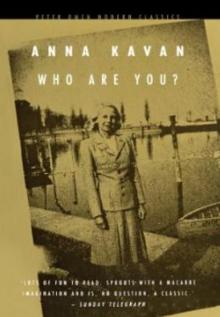 Who Are You?
Who Are You?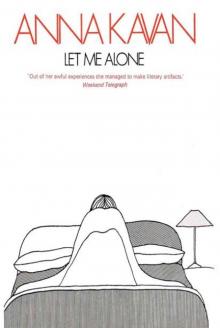 Let Me Alone
Let Me Alone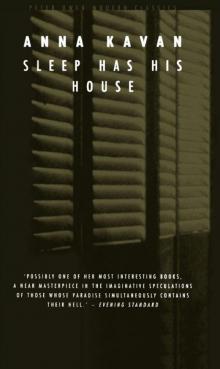 Sleep Has His House
Sleep Has His House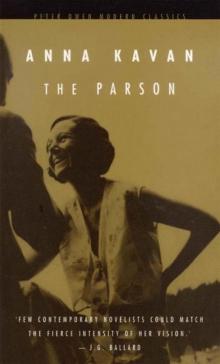 The Parson (Peter Owen Modern Classic)
The Parson (Peter Owen Modern Classic)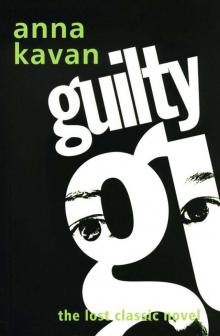 Guilty: The Lost Classic Novel
Guilty: The Lost Classic Novel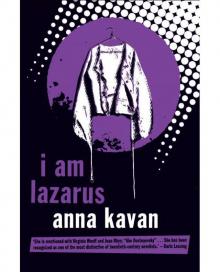 I Am Lazarus (Peter Owen Modern Classic)
I Am Lazarus (Peter Owen Modern Classic)